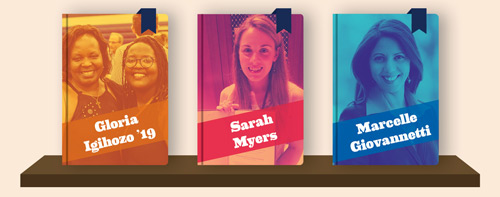Zoom in on live storytelling

The Office of Diversity Affairs and Murray Library hosted its third annual Human Library Project via Zoom March 24. This storytelling platform allows volunteers to be “open books,” sharing personal stories with attendees. The concept is designed to build a positive framework to challenge stereotypes and prejudices through dialogue. Here are a few of the “books” from this year’s event:
Gloria Igihozo ’19, a lecturer in healthcare management and global health delivery at the University of Global Health Equity in Rwanda, spoke about how the Rwandan genocide shaped her life. Her story begins:
You wake up on a sunny morning to find death knocking on your door. You have less than a day to flee to safety with a baby, two toddlers and the little you have left. Learn about the journey of a single mother in a refugee camp in the Democratic Republic of Congo and her struggle to regain independence.
“Being a featured book was an opportunity to share my story with a wider audience that I might not have ever gotten to interact with,” said Igihozo. “Doing the event via zoom was harder, because you can’t tell what everyone’s reactions are. This might be a blessing in disguise as I don’t have to worry about what people will think or how their reactions might impact my ability to share pieces of the story I often hesitate to share. But, I like that Zoom can connect people and nations apart. Without zoom, it wouldn’t have been possible for me to join the human library event as a book.”
Igihozo says the event is a platform to learn about each other. “It allows us to see the humanity in all of us, which is a crucial tie that binds us all together and makes us realize that we are more similar than we are different and that even our differences shouldn’t threaten us,” she said.
Sarah Myers, who works as a librarian at Messiah, detailed her experience working at George Washington’s Mount Vernon for her first job after college:
At the newly established presidential library for George Washington, I had national treasures at my fingertips. I learned a lot about “George” and even more about myself.
“Very rarely do we pause to just listen. Others have so much in their lives that make them who they are today, and the Human Library allows the readers to get a small glimpse into that life,” said Myers of the experience. “With my love of history, talking about my time at Mount Vernon makes me light up with joy. What an amazing, once-in-a-lifetime chance it was to be hands-on with the first president’s books and letters.”
Marcelle Giovannetti, assistant professor of counseling, discussed being a part of the sandwich generation, caring for elderly parents and her own children:
This book explores the struggle to care well for loved ones and dependents, while maintaining a holistic, healthy life balance and emphasizes the need for a community of support.
“The Human Library provides an avenue for individuals at Messiah to be seen and heard,” Giovannetti. “For me, experiencing people who don’t know me at all, who willingly took the time out of their busy lives to hear my story is powerful and humbling.”
She says, to create a community of belonging, simply showing up to listen deeply to someone else’s story is unbelievably validating.
“When we listen to a person’s uninterrupted narrative, we have the opportunity to become consumers and witnesses of their truth. This makes us better advocates for things that we might not always be aware of due to privileged identities we hold.”
Technical Services Coordinator Liz Kielley, co-chaired the event, says connections made at the event last long after the storytelling. “Some readers and books get together later and continue the conversation,” said Kielley.
— Anna Seip